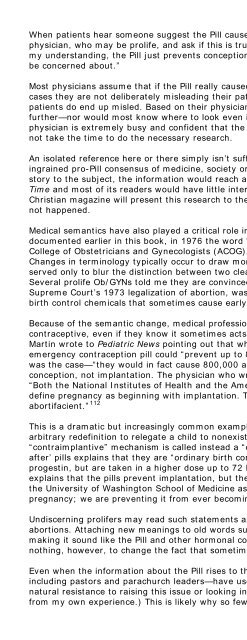Does the Birth Control Pill Cause Abortions
Does the Birth Control Pill Cause Abortions
Does the Birth Control Pill Cause Abortions
You also want an ePaper? Increase the reach of your titles
YUMPU automatically turns print PDFs into web optimized ePapers that Google loves.
When patients hear someone suggest <strong>the</strong> <strong>Pill</strong> causes abortions, <strong>the</strong>y will often come to <strong>the</strong>ir<br />
physician, who may be prolife, and ask if this is true. The physician may sincerely say, “According to<br />
my understanding, <strong>the</strong> <strong>Pill</strong> just prevents conception, it doesn’t cause abortions. You have nothing to<br />
be concerned about.”<br />
Most physicians assume that if <strong>the</strong> <strong>Pill</strong> really caused abortions, <strong>the</strong>y would surely know it. In most<br />
cases <strong>the</strong>y are not deliberately misleading <strong>the</strong>ir patients. Unfortunately, <strong>the</strong> bottom line is that <strong>the</strong>ir<br />
patients do end up misled. Based on <strong>the</strong>ir physician’s reassurances, <strong>the</strong>y don’t look into <strong>the</strong> matter<br />
fur<strong>the</strong>r—nor would most know where to look even if <strong>the</strong>y wanted to. In reality, <strong>the</strong> dedicated<br />
physician is extremely busy and confident that <strong>the</strong> <strong>Pill</strong> only prevents conception; typically he too does<br />
not take <strong>the</strong> time to do <strong>the</strong> necessary research.<br />
An isolated reference here or <strong>the</strong>re simply isn’t sufficient to change or even challenge <strong>the</strong> deeply<br />
ingrained pro-<strong>Pill</strong> consensus of medicine, society or <strong>the</strong> church. If Time magazine devoted a cover<br />
story to <strong>the</strong> subject, <strong>the</strong> information would reach a popular level in a way it never has before. But<br />
Time and most of its readers would have little interest in <strong>the</strong> subject. Perhaps eventually a major<br />
Christian magazine will present this research to <strong>the</strong> people who should care <strong>the</strong> most. So far this has<br />
not happened.<br />
Medical semantics have also played a critical role in obscuring <strong>the</strong> <strong>Pill</strong>’s abortive mechanism. As<br />
documented earlier in this book, in 1976 <strong>the</strong> word “contraceptive” was redefined by <strong>the</strong> American<br />
College of Obstetricians and Gynecologists (ACOG), to include agents that prevent implantation.<br />
Changes in terminology typically occur to draw more careful scientific distinctions, whereas this one<br />
served only to blur <strong>the</strong> distinction between two clearly separate things, fertilization and implantation.<br />
Several prolife Ob/GYNs told me <strong>the</strong>y are convinced this move, happening three years after <strong>the</strong><br />
Supreme Court’s 1973 legalization of abortion, was a deliberate attempt to obscure concerns about<br />
birth control chemicals that sometimes cause early abortions.<br />
Because of <strong>the</strong> semantic change, medical professionals can honestly say that <strong>the</strong> <strong>Pill</strong> is only a<br />
contraceptive, even if <strong>the</strong>y know it sometimes acts to prevent implantation. For example, Dr. Linda J.<br />
Martin wrote to Pediatric News pointing out that while an August 1997 article had claimed <strong>the</strong><br />
emergency contraception pill could “prevent up to 800,000 abortions a year,” exactly <strong>the</strong> opposite<br />
was <strong>the</strong> case—“<strong>the</strong>y would in fact cause 800,000 abortions a year.” Her logic was that life begins at<br />
conception, not implantation. The physician who wrote <strong>the</strong> article, Dr. James Trussel, responded,<br />
“Both <strong>the</strong> National Institutes of Health and <strong>the</strong> American College of Obstetricians and Gynecologists<br />
define pregnancy as beginning with implantation. Therefore, emergency contraceptive pills are not<br />
abortifacient.” 112<br />
This is a dramatic but increasingly common example of semantic depersonalization—using an<br />
arbitrary redefinition to relegate a child to nonexistence. What might properly be called a<br />
“contraimplantive” mechanism is called instead a “contraceptive” mechanism. An article on ‘morning<br />
after’ pills explains that <strong>the</strong>y are “ordinary birth control pills containing <strong>the</strong> hormones estrogen and<br />
progestin, but are taken in a higher dose up to 72 hours after unprotected intercourse.” 113 The article<br />
explains that <strong>the</strong> pills prevent implantation, but <strong>the</strong> large font pull quote from Dr. Jack Leversee of<br />
<strong>the</strong> University of Washington School of Medicine assures readers, “We are not doing away with a<br />
pregnancy; we are preventing it from ever becoming a pregnancy.”<br />
Undiscerning prolifers may read such statements and be reassured that <strong>the</strong>se pills don’t cause<br />
abortions. Attaching new meanings to old words such as conception and pregnancy has succeeded in<br />
making it sound like <strong>the</strong> <strong>Pill</strong> and o<strong>the</strong>r hormonal contraceptives don’t kill human beings. It has done<br />
nothing, however, to change <strong>the</strong> fact that sometimes that’s exactly what <strong>the</strong>y do.<br />
Even when <strong>the</strong> information about <strong>the</strong> <strong>Pill</strong> rises to <strong>the</strong> surface here and <strong>the</strong>re, so many Christians—<br />
including pastors and parachurch leaders—have used and recommended <strong>the</strong> <strong>Pill</strong>, that we have a<br />
natural resistance to raising this issue or looking into it seriously when o<strong>the</strong>rs raise it. (I know this<br />
from my own experience.) This is likely why so few individuals or organizations have researched or



